The Buddhist Geeks Conference 2011
06 August 2011“You are totally double rainbowing my world.” Nikki Chau (@dragonc)
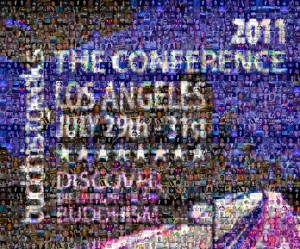
I was at the first ever Buddhist Geeks conference last week. It was epic. I’ve been to Buddhisty meetups; retreats, dharma talks and so on, and I’ve been to geeky meetups; web conferences, usability groups etc. But never have I experienced the unity of the two. The ‘geek’ in Buddhist Geeks means a few things. Most generally it reflects the sentiment expressed in the Jargon File’s definition,
“A person who has chosen concentration rather than conformity; one who pursues skill (especially technical skill) and imagination, not mainstream social acceptance. Geeks usually have a strong case of neophilia. Most geeks are adept with computers and treat hacker as a term of respect”
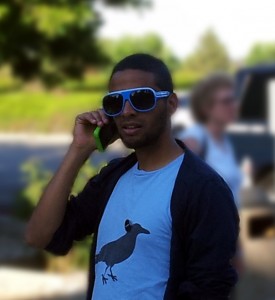
So, although “geeks are adept with computers”, this isn’t necessarily their defining characteristic; pride in technical knowledge and ability is also a significant ingredient. You could see this wider understanding echoed in the various titles of the talks, sessions and panels, “The Science of Enlightenment”, “Awakening is an Epic Win?”, “Disrupting the Awakening Industry”, “The Emerging Face of Buddhism”, to give just a small selection. Though to be fair there was a generous helping of traditional computing culture in the mix too; it seemed most people had a Twitter account (as the above mosaic testifies) or wrote a blog or developed some funky Mindfulness 2.0 web app. At the very least there was a reliable well of Internet vocabulary to draw on; we’d all listened to dharma talks online, watched Youtube videos of our favourite teachers, frequented or heard of the various forums and resources, and of course visited buddhistgeeks.com.
I shan’t go into too much detail about the specifics of the conference events, others have documented this well already, instead I’d like to ruminate more on the symbolic significance of the gathering. I’d like to start with this tweet;
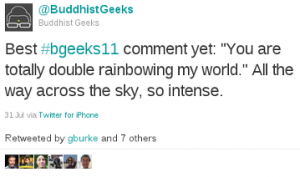
If you haven’t heard of the Double Rainbow meme (or Internet memes at all for that matter) then take a look at Know Your Meme’s entry in their comprehensive ‘meme database’. I find Internet memes truly fascinating, often hilarious and sometimes disturbing. On the surface, the endless torrents of apparently banal and tedious, say, cat pictures, may seem desperately irrelevant and mind-numbing, but I see a deeper truth behind it all. The Web — as Ethan Nichtern pointed out in his Saturday talk, “The Internet is not your Teacher” — contains the two extremes of life and everything in between; from the profoundly uplifting to the sickeningly depressing. As someone who spends a lot of time surfing the Net, this ease of access to life’s poles of significance can lead to what I’d like to term, an ironic irreverence. When, on a daily basis, you bear witness to the myriad facets of our diverse universe — from the personal, the courageous, the virtuoso, the embarrassing and the political, to the natural, the microscopic, the galactic and the historical — one develops a certain ennui.
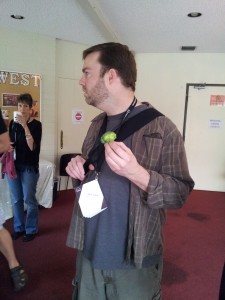
The Double Rainbow meme perfectly exemplifies this ironic irreverence — the original video itself doesn’t, but the meme does. Paul Vasquez, the star of the meme’s seed, is deeply and genuinely, if not spiritually, moved by the double rainbow he comes across. He is expressing an emotion towards the sublime end of the Internet scale, albeit in a slightly intense and intoxciated fashion. The meme is essentially a riff on this curious mix of emotions. For instance there is a video parody where someone drives up to a billboard advertising a double burger deal and, in the style of Double Rainbow Man, exclaims in amazement.
Now here I would like to take a, perhaps unexpected, conceptual leap by suggesting that the prevailing sentiment of Internet memes actually reflects a dominant sentiment of awakening, namely equanimity. As spiritual adventurers we tend to come across certain refined (and unrefined) states, yet we are endlessly encouraged to recollect the impermanence, emptiness and unsatisfactoriness of these (and all) states. An awakened attitude is not some kind of permanent double-rainbow rapture (yes you really did just read those combination of words), but rather engages sincerely with each and every state. Meme culture is similar. Ironic irreverence is not a denial of the spectrum of consumable media but rather a sober gesture towards the potential for LITERALLY ANYTHING!!1! (see the Capslock meme) to trigger curiosity and wonder.
I’d like to think, though I may be stretching it a bit now, that a version of this down-to-earth attitude is responsible for a greater demand in transparency and integrity from the emerging generation of dharma practitioners. For instance, the upcoming movement of Pragmatic Dharma that, amongst many other pragmatic sentiments, lifts the taboo on explicitly delineated paths that provide the basis for asserting one’s achievement of Enlightenment. Perhaps one caveat that could be levelled at this particular overturned taboo however, is that the accompanying taboo — that Enlightenment doesn’t actually negate the capacity for someone to be totally immoral and immature — is rarely uncovered in tandem. I don’t want to unnecessarily focus on this darker stuff, but there was a palpable sense of tension during the Sunday panel discussion, “The Emerging Face of Buddhism”, where money and power were discussed. I think the backdrop of recent scandals, such as Genpo Roshi’s affair, were the proverbial elephants in the room. Willougbhy Britton, a researcher into the downsides of meditation, asked a pressing question to the panel about the legal implications of charging for the dharma and how teachers should deal with stricter structures of accountability.
Far from being an uncomfortable detour into disconcerting territory I felt it was commendable to the calibre of Buddhist Geeks and the organisation of the conference that such conversations could be encountered. Equanimity in the face of the sparkly lights and the unsightly shadows.
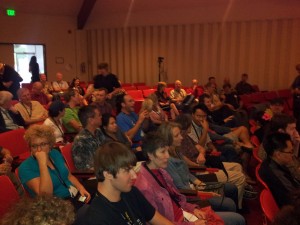
Dialogue is a fundamental cornerstone of Buddhist Geeks, very few other dharma organistaions open up such a diverse conversation. Already engaged in podcasts with teachers from a cross-section of traditions, reader-contributted articles, rich comment threads and social networks, the Geeks can now add conferences to its repertoire. Maybe Buddhist Geeks is a meme? Perhaps the first in a family of liberating memes? The subject came up a few times in the conversations I was having about an ‘Enlightment machine’, a technological device that, through bio-data and user feedback, could lead someone towards the state of liberation. There does certainly seem to be a lot of research pointing in this general direction, for example Kelly McGonigal’s talk, “What Science Can Teach Us About Practice”, on the neuroscience of meditation, has found distinct regions of the brain that are tangibly more active in long-term meditators. However, upon reflection, I’m sceptical of such a device. The goal of dharma practice has too significant a social aspect to it. If technology is to play a role in the process of spiritually maturing humans I think its form will be less tangible and more concerned with the facilitation of the huge pre-existing community of support around the world.
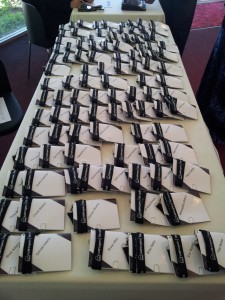
To meet others that I can so readily relate to is of incalculable value to me. Buddhist Geeks 2011 hasn’t just animated my practice but it has brought to life and humanised, the Internet.
"But what does it mean!?"
Paul Vasquez
 tom bh
tom bh